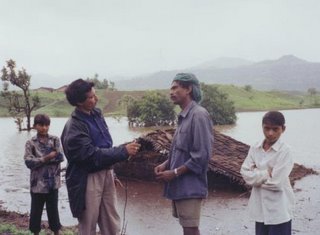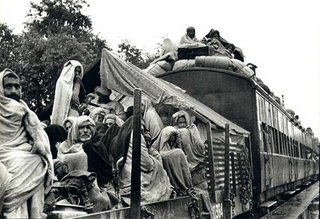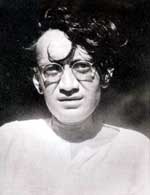THE THEME OF DISPLACED PEOPLE IN LITERATURE, FILMS, PEOPLE'S MOVEMENTS. EVERYWHERE, BUT IN POLITICIANS' MYOPIC RADII.
Over the past few weeks, a dam suddenly took centrestage in Indian television news channels. The issue wasn't new though. The dam, Sardar Sarovar, was first envisaged in the reign of independent India's first prime minister, Jawaharlal Nehru. Since then, there has been steady progress on its construction. Not without a cost though. Apart from the gigantic financial figures involved, the dam has in the past, and continues to, uproot people from their lands. And that's what took the spotlight in the TV channels--the ongoing protest of these displaced people, most of them illiterate farmers and adivasis.
Over the past few weeks, a dam suddenly took centrestage in Indian television news channels. The issue wasn't new though. The dam, Sardar Sarovar, was first envisaged in the reign of independent India's first prime minister, Jawaharlal Nehru. Since then, there has been steady progress on its construction. Not without a cost though. Apart from the gigantic financial figures involved, the dam has in the past, and continues to, uproot people from their lands. And that's what took the spotlight in the TV channels--the ongoing protest of these displaced people, most of them illiterate farmers and adivasis.
 Image source: Friends of River Narmada (http://www.narmada.org/index.html)
Image source: Friends of River Narmada (http://www.narmada.org/index.html)They have been leading a peaceful people's movement, called the Narmada Bachao Andolan (NBA) or Save the Narmada Movement, led by the indomitable Medha Patkar for nearly two decades, demanding proper rehabilitation. Yet, like so often happens with poor and dispossessed people, their needs have been marginalized by successive governments.
 Photographer: Venu Govindu
Photographer: Venu GovinduImage source: Friends of River Narmada (http://www.narmada.org/index.html)
Things came to a head in the past few weeks, as it became evident that all the rehabiliation the government assured it had done, was only carried out on paper. This is when the movement took a decisive turn, with Medha Patkar going on an indefinite hunger strike until work on the dam was stopped, and the affected people were properly resettled. She and her band of activists, which includes the affected farmers and adivasis, launched a peaceful protest in New Delhi, battling it out under the open sky in the middle of the searing summer heat. The Indian government was embarrassed as public support rose for these hapless victims of "development."
 Image source: Friends of River Narmada (http://www.narmada.org/index.html)
Image source: Friends of River Narmada (http://www.narmada.org/index.html)And then, a famous Hindi film actor, along with some of his colleagues jumped into the scene by showing solidarity with these displaced people. Suddenly, the movement became a big, flashy news for the electronic media. This is exactly what the actor, Amir Khan had sought to do--bring the issue back to public focus and elicit support for the displaced people in the process.
Amir isn't the first celebrity to show support for the NBA though. Booker Prize winner, Arundhati Roy, has been voicing her concerns for the affected people for quite a few years now. As have been other actors, writers, and scholars.
As I watched the news reports of these high-profile creative personalities joining hands with a people's movement, a question came to me. Why is it that politicians fail to see what artists and those involved in education do? The simple fact that development which comes at the cost of depriving people of a dignified existence is self-defeating to say the least? I haven't found the answer.
This led me to think about how this very theme--displaced people--has resulted in some of the finest literature and filmmaking. I recalled the stories Sadat Hasan Manto wrote on the partition of India, an event that led to the creation of Pakistan and remains one of the bloodiest carnages in human history. Manto's stories are spine-chilling in their matter-of-fact, unembellished style. The partition, carried out on the basis of religion (a majority-Hindu state of India vs an Islamic Pakistan), was of course masterminded by politicians, in which innocent civilians paid the price with their lives. Doesn't that sound all too familiar?
 As the seeds of hatred were sown, using rumours and provocative insinuations as devices, Hindus and Muslims who had been co-existing peacefully for centuries, were suddenly fervid to slay each other. I remember a statement of Manto reflecting on this mass insanity that seemed to have gripped the populace of the region at the time (1947-48). He said, "The funny part about them (Hindus and Muslims) killing each other wasn't that they hated each other. It was that they loved each other." (paraphrased)
As the seeds of hatred were sown, using rumours and provocative insinuations as devices, Hindus and Muslims who had been co-existing peacefully for centuries, were suddenly fervid to slay each other. I remember a statement of Manto reflecting on this mass insanity that seemed to have gripped the populace of the region at the time (1947-48). He said, "The funny part about them (Hindus and Muslims) killing each other wasn't that they hated each other. It was that they loved each other." (paraphrased) Manto wrote several short stories on the theme of partition, most of them straightforward depictions of what was happening then. One story particularly jolted me. It talks of how an armed man goes on a killing spree while walking on the streets. He fires gun shots at anyone passing by, for no apparent reason other than the sheer sadistic joy of it. Just as his gun fires its last bullet, killing a woman, he spots a little boy walking towards him. The man gets all excited and aims his pistol at the child. Seeing this, his companion reminds him the pistol has no bullets left. To which the gun-lover says, how would the child know that? Such is his frenzy of spreading terror among ordinary people.
Manto wrote several short stories on the theme of partition, most of them straightforward depictions of what was happening then. One story particularly jolted me. It talks of how an armed man goes on a killing spree while walking on the streets. He fires gun shots at anyone passing by, for no apparent reason other than the sheer sadistic joy of it. Just as his gun fires its last bullet, killing a woman, he spots a little boy walking towards him. The man gets all excited and aims his pistol at the child. Seeing this, his companion reminds him the pistol has no bullets left. To which the gun-lover says, how would the child know that? Such is his frenzy of spreading terror among ordinary people.Although I never witnessed the horrors of partition, I experienced it through the stories recounted by my grandparents. Born in an undivided India, they were among the lot who had to give up the land that was once their entire world, forever. I remember how my grandma never grew tired of telling us stories of her childhood, the landscape etched in photographic detail in her mind's eye. Even as a child I could see how she pined for the Bengal that became a part of Pakistan, and then branched out into a new country--Bangladesh. How vividly she painted the rivers and tributaries, the amazing fruits and vegetables she enjoyed as a little girl and could never find in her new environment, the intrinsic bond between Hindus and Muslims in her village...All that was hers once, yet could never be again.

An accomplished Bengali writer, Grandma used the motifs of her vibrant green past, time and again in her stories. As did she use the themes of people being uprooted, victimized, and humiliated by self-serving politicians (I do plan to post one of her stories on partition traumas, translated by me, here.)
 As I grew up, I found a resonance of my grandma's pain of separation from her land in the films of a remarkable filmmaker. His name is Ritwik Ghatak. A victim of partition himself, Ghatak never got over the trauma of displacement. It appears as a recurrent theme in most of his films. I remember, when I first watched Komal Gandhar (E-Flat), I realized the extent of emotional scars permanent displacement can inflict in people. Ghatak continued to talk about this anguish in films like Subarnarekha, Nagarik (The Citizen), and Meghe Dhaka Tara (The Cloud-capped Star). A lot of his critics felt Ghatak was in denial--refusing to accept the reality he was faced with. Perhaps he was. But perhaps those critics never knew what getting uprooted from home meant. I say this because I know Grandma never got over the fact that she could not claim the land she was born in as her own, ever again.
As I grew up, I found a resonance of my grandma's pain of separation from her land in the films of a remarkable filmmaker. His name is Ritwik Ghatak. A victim of partition himself, Ghatak never got over the trauma of displacement. It appears as a recurrent theme in most of his films. I remember, when I first watched Komal Gandhar (E-Flat), I realized the extent of emotional scars permanent displacement can inflict in people. Ghatak continued to talk about this anguish in films like Subarnarekha, Nagarik (The Citizen), and Meghe Dhaka Tara (The Cloud-capped Star). A lot of his critics felt Ghatak was in denial--refusing to accept the reality he was faced with. Perhaps he was. But perhaps those critics never knew what getting uprooted from home meant. I say this because I know Grandma never got over the fact that she could not claim the land she was born in as her own, ever again.So my question remains: why is it that politicians fail to see what writers, filmmakers, artists, and musicians do? If you have an answer, let me know.
Thanks for the comments, Susan and Tsavo.
ReplyDeleteSusan, this is one question that really pricks me, and thus I felt compelled to write this post. Thanks for taking the time to read it. Oh, and I did check your reply to my comment on your blog. Do submit that brilliant piece and keep me posted about it!
Tsavo, thanks for sharing your insights with which I am mostly in agreement. Of course politicians have lost their purpose in a rather vulgar manifestation of "power corrupts." I empathize with the Palestinian cause a lot, that being another classic example of displaced people surviving almost in a hopeless void.
As for the majority voting for people as opposed to parties, I can't say that's so much the case in India (barring a few exceptions, of course). The trouble I see here is that we are forced to choose between lesser and greater evils--all parties are corrupt, varying only in degrees. A sad and helpless situation for the people, really. You are right; democracy seems to be losing its potential for just governance.
Still redeeming amid this dark scenario in India is our effective judiciary and our vibrant new electronic media. Both these estates are doing a good job of listening to the oppressed and dispossessed and making their voices heard. A lot still goes unheard though.
Wow. That was a long rant. I will end it now. :P
Modern communication and the democratic idea of free speech has brought a voice that the displaced from other eras did not have.
ReplyDeleteCompletely agree, Bernita.
ReplyDeleteOk Bhas, and I think even the newer one on The Wind in the Willows may me a good one for an appropriate mag? What do you think? And also my observation to your question on this post, I think with the majoriy of politicians it's more a situation of power and control. Power to the rich is more important than money. It defines their status and importance. And yes, Bhas, it may either deliberately or 'unintentionally' block their vision. *love*
ReplyDeleteHi Susan. I will check out your new post; I am sure it's another good one. And of course, you are bang on about the politicians' typical mindset.
ReplyDeletethat sure makes a lot of sense unfortunately a huge number of people simply discredit the movement criticising Medha an d arundhati now the current issue is not their views but govt backing down on its promise of rehabilitating the displced and rendering them dispensable which is both unfair and unfortunate.
ReplyDeleteWelcome to my blog, Tanvi. Indeed, the issue here is not celebrity activists, but about how the government is turning a blind eye to people's call for justice.
ReplyDelete